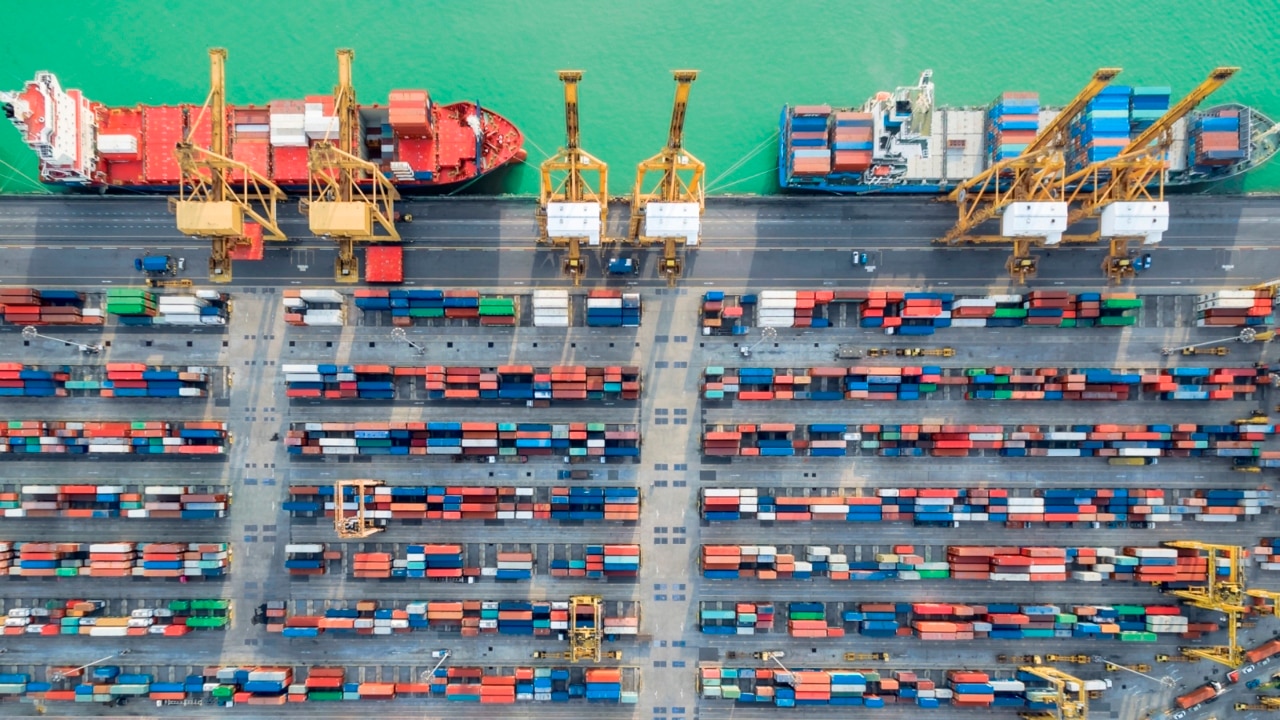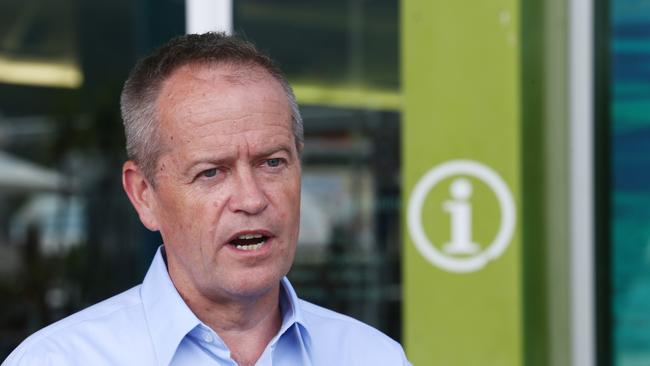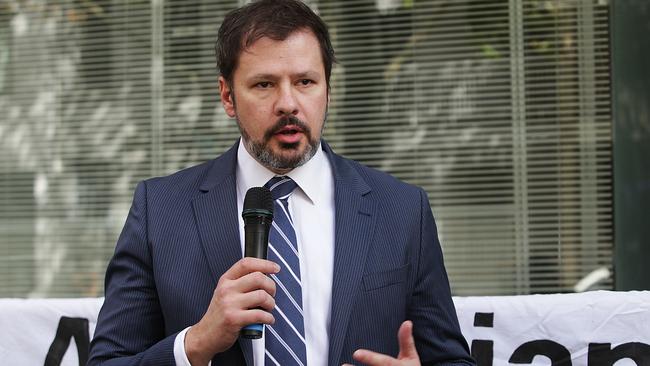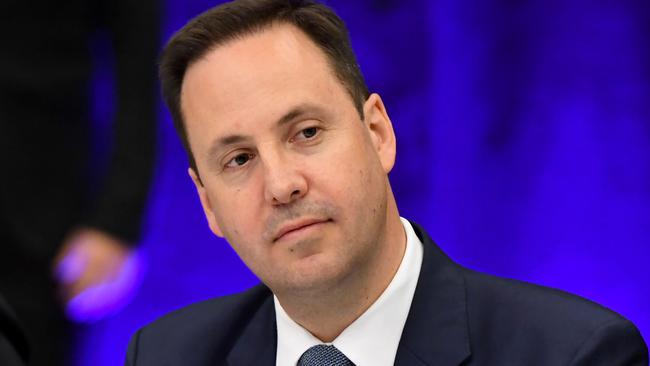Shorten ‘butt of his own joke’ on TPP, says Scott Morrison
Treasurer Scott Morrison says Bill Shorten has become the “butt of his own joke” about the trans-Pacific partnership.

Treasurer Scott Morrison says Bill Shorten has become the “butt of his own joke” about the trans-Pacific partnership, after the Turnbull government struck the deal the Labor leader said was “dead” in the absence of the United States.
Pending ratification from the participating countries’ parliaments, the historic deal between 11 Pacific Rim countries is set to be signed in March, after Japan and Australia persuaded Canada to revisit the agreement during talks at the World Economic Forum in Davos, Switzerland yesterday.
Trade Minister Steven Ciobo says it will boost Australia’s exports, drive economic growth and create jobs, but Labor employment services spokesman Ed Husic said it was a “fundamentally different” and weaker arrangement without the United States.
Business groups including the Australian Industry Group, Minerals Council and Australian Chamber have today praised the new TPP.
Mr Morrison said Mr Shorten was a “serial offender” against the Australian economy.
“Initially he was against the Chinese free trade agreement,” Mr Morrison said.
He said Mr Shorten had worked against the government’s business tax cuts.
“He ridiculed the government continuing to pursue the TPP. He made jokes about it.
“He’s become the butt of his own joke on the TPP because the Prime Minister and the Trade Minister worked to get this done.”
Prime Minister Malcolm Turnbull said nobody had been more pessimistic about the TPP than Mr Shorten.
“Nobody was more pessimistic about it, more lacking in enthusiasm, more lacking in confidence for the enterprise of Australians than Bill Shorten,” Mr Turnbull said.
“Bill Shorten said the TPP was dead and we should down tools and stop working to keep it going.
“Well, we didn’t take his advice on this or any other matter. We’re not going to start doing that because he’s got no policy that support investment or employment.
“We stuck with the TPP. There have been some hills and hollows and some twists and turns along the way since the APEC meeting in Lima in 2016, after it was known that President Trump would pull out.
“We stuck with it. And with great support and great leadership with the countries in the TPP 11, especially of course Japan, where I was just a few days ago, we’ve seen that leadership and now we look forward to the legal documents, the treaty, being signed in Chile next month. It’s a great outcome.”
Mr Turnbull said the deal would means billions of dollars of additional exports and thousands of additional jobs.
Bill Shorten under pressure to ratify trans-Pacific partnership
Labor has long been sceptical about the deal, and is now under pressure to reveal whether it will vote it down, as it pledged to do last year.

On January 16 2017, Labor trade spokesman Jason Clare said the deal would “never exist”, at least in its current form.
“Unless the United States ratifies the TPP it does not come into effect and President-elect Trump has made clear that’s not going to happen,” Mr Clare said at the time.
“Malcolm Turnbull wants to pass legislation to implement an agreement that will never exist, at least not in its current form.
“It’s like turning up to a party that has been cancelled and dancing on your own on the front laws, thinking it will convince the owners to put the party back on.”
Asked whether Labor would vote against the ratification of the TPP the following day, Mr Shorten said the deal was over.
“It’s dead. It’s not going anywhere. Trump has said this. Everyone knows it. So why is Malcolm Turnbull not getting on with sorting out and protecting Australian jobs?” he said.
A week later, Mr Shorten reiterated that President Trump had killed off the deal.
“The Japanese Government has come out today and said that without the United States, this trade treaty is meaningless,” Mr Shorten said on January 25, 2017.
“Malcolm Turnbull doesn’t have to take my word for it, he doesn’t have to take Donald Trump’s word for it, maybe he should just take the Japanese Government’s word for it.”
Trans-Pacific Partnership deal ‘weaker without US’: Husic
Labor’s employment services spokesman Ed Husic this morning said the new deal was a “fundamentally different” and weaker arrangement than it would have been with the inclusion of the United States.
Mr Husic said Mr Shorten had been “absolutely right” to say that the original TPP deal was “dead” after US President Donald Trump pulled out last year.
“I think if you look at the inclusion of the US, I think it would have captured about 40 per cent of global economic output,” Mr Husic told Sky News.
“It’ll now capture a shade under 15 per cent under the new arrangements, so it is a fundamentally different deal.
“While Labor is supportive of quality regional trade agreements, we want to get the actual data that backs up that these new arrangements that the government’s crowing about will actually deliver in terms of Australian jobs.”
Mr Husic said Mr Ciobo’s reliance on economic modelling which was done for the agreement before the US pulled out was “extraordinary”, calling for independent modelling to be done to establish precisely what the economic benefits of the deal would be for Australia.
“When we do these things they involve sacrifices on both sides of the negotiating table in terms of trade agreements, and you need to know what the washout of all those sacrifices and the negotiations and the compromises that are made, what that translates to in economic terms,” he said.
“The other thing is that the Trade Minister in his interview with you on that point that I reflected on a few moments ago was claiming that economic modelling wasn’t worth it because you couldn’t work out what the impact of the secondary effects would be. This is just ridiculous.
“I mean the deal’s either got to be good for Australia or not.”
Mr Husic said he was concerned that Australia’s labour market testing regimen was not as rigorous of those in other countries.
“In Singapore, I was there in November for example, they have a very extensive labour market testing regimen that makes sure that Singaporeans are considered first for jobs ahead of firms importing labour,” he said.

“Now when you raise that point in the Australian context, you’re seen as some sort of economic Neanderthal when the reality is you want trade agreements to work for everyone, not for some.”
Mr Husic also warned that Mr Ciobo’s “crowing” about the deal could have negative consequences.
“I notice the Trade Minister crowing about beef access arrangements for Australian producers, that’s great, and he was saying that it’d be better than what the US gets,” he said.
“Well let’s see how the US responds to that type of crowing because you could imagine that the US would potentially use its strategic relationship with Japan and its economic strength, relative economic strength to get arrangements that could potentially undermine what arrangements have been made in the TPP. You just don’t know what might happen down the track.”
New TPP will mean jobs: Ciobo
Mr Ciobo said the agreement was a “great deal” for Australia.
“It’s going to really help to boost our exports, it’s going to ensure that we continue to drive economic growth, and ultimately it’s all about creating jobs for Australians,” he said.
Mr Ciobo said negotiators had worked with Canada after the country pulled out of talks in Da Nang, Vietnam last year.
“Canada raised some concerns specifically in relation to some exemptions they were after on the fact that they have a large minority that speak French and so they wanted some changes in relation to broadcast policies that were outlined in the TPP,” Mr Ciobo told ABC radio.
“They were more reasonable this time around, we were able to find consensus, we were able to find middle ground, and as a consequence all the unresolved issues have largely settled and that’s why we’ve got this agreement.”
The deal applies to the 11 Pacific Rim countries of Australia, Brunei Darussalam, Canada, Chile, Japan, Malaysia, Mexico, New Zealand, Peru, Singapore and Vietnam, whose economies represent some $13.7 trillion in economic activity.
Mr Ciobo said almost a quarter of Australia’s exports currently went to TPP 11 countries.
“We have now got a situation where we’ve got two new free trade agreements with Canada and Mexico as well as enhanced access into a number of markets, some of which of course we’ve already got free trade agreements in place,” he said.
“If you take, for example beef, under the TPP 11, Australian beef producers will have increased access with a more rapid decrease in tariffs on beef into Japan.
“This is going to greatly provide a competitive advantage to our beef producers with respect to Japan, and certainly it’ll be at the expense of US beef producers who will continue to have higher tariffs than we face.”
Mr Ciobo played down concerns over the Investor State Dispute System clauses, which critics have argued could allow foreign companies to sue the Australian governments over laws such as tobacco plain packaging.

“If there was ever a scare campaign that’s been run, it’s been the absurd scare campaign around ISDS or Investor State Dispute Settlement,” he said.
“For example, let’s be clear: Australia won the action with respect to plain packaging.
“More importantly ISDS protects Australian investments abroad. People always want to conveniently ignore the fact that it actually means, and in fact if you look at the use of ISDS it’s been used by Australian businesses overseas far more than it’s ever been used against Australia.”
Mr Ciobo said the TPP would “absolutely not” lessen the Australian government’s ability to regulate big corporations.
“We retain the ability to regulate, to put in place domestic policy in a range of areas including biosecurity, health policy, environmental policy, all of these kinds of things,” he said.
Mr Ciobo also dismissed concerns about the impact on Australia’s labour market.
“It doesn’t mean that there’s going to be an invasion of foreign workers who are unskilled, who are unqualified,” he said.
“I mean frankly we saw that kind of rubbish being pedalled by the trade union movement with respect to the China-Australia Free Trade Agreement.
“We unfortunately saw that disgusting campaign condoned by the Australian Labor Party because it suited them to twist the truth. I can absolutely reassure all listeners that there is no dilution of the Australian government’s or the Australian parliament’s ability to regulate our labour market.”
Mr Ciobo also hinted at a further trade agreement, with talks continuing over the Regional Comprehensive Economic Partnership, or RCEP, with the ASEAN nations of Australia, China, India, Japan, Korea, New Zealand and countries which have existing free trade agreements with ASEAN.
“I’m very hopeful that we’ll be able to conclude a high quality deal with the ASEAN countries plus the other six that make up RCEP,” Mr Ciobo said.
“Again, more opportunity for Australian exporters to be able to tap into great market access across different economies and I hope this deal happens as well.”






